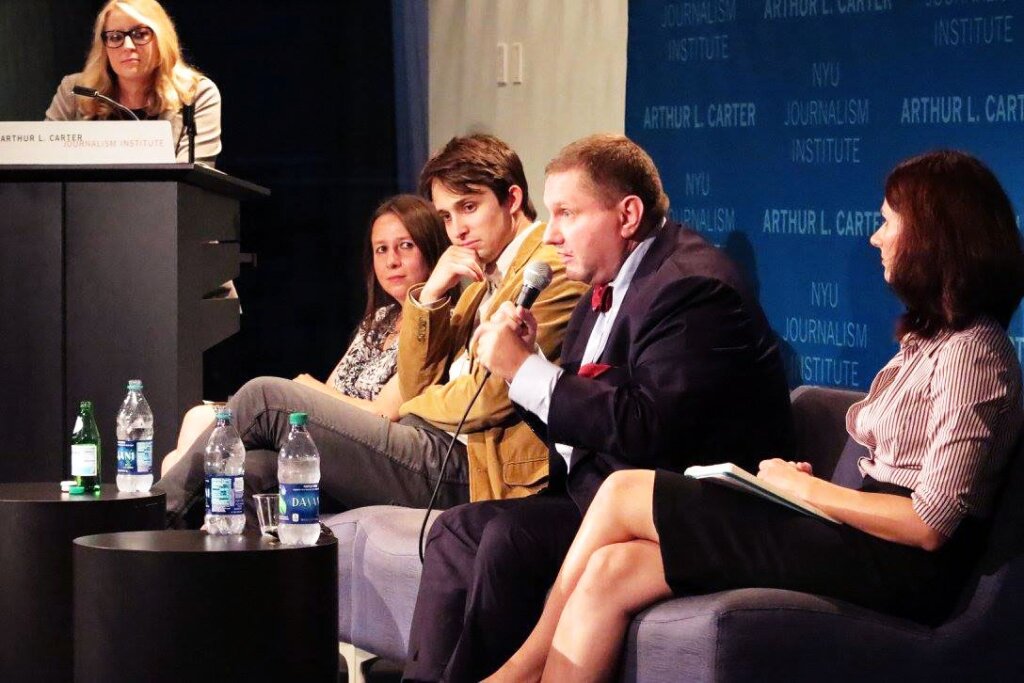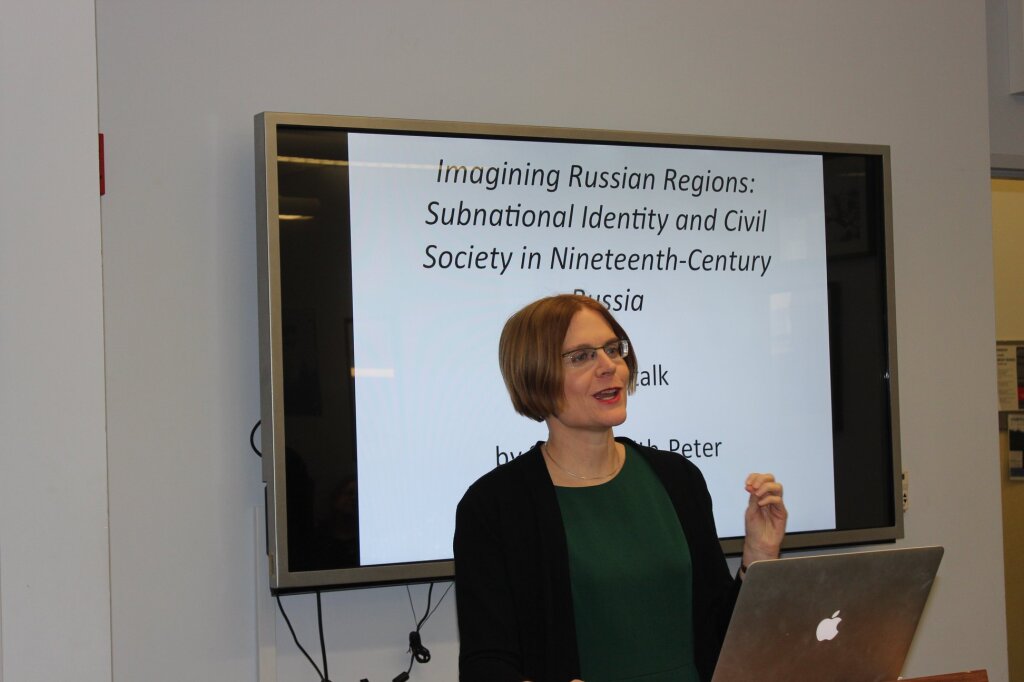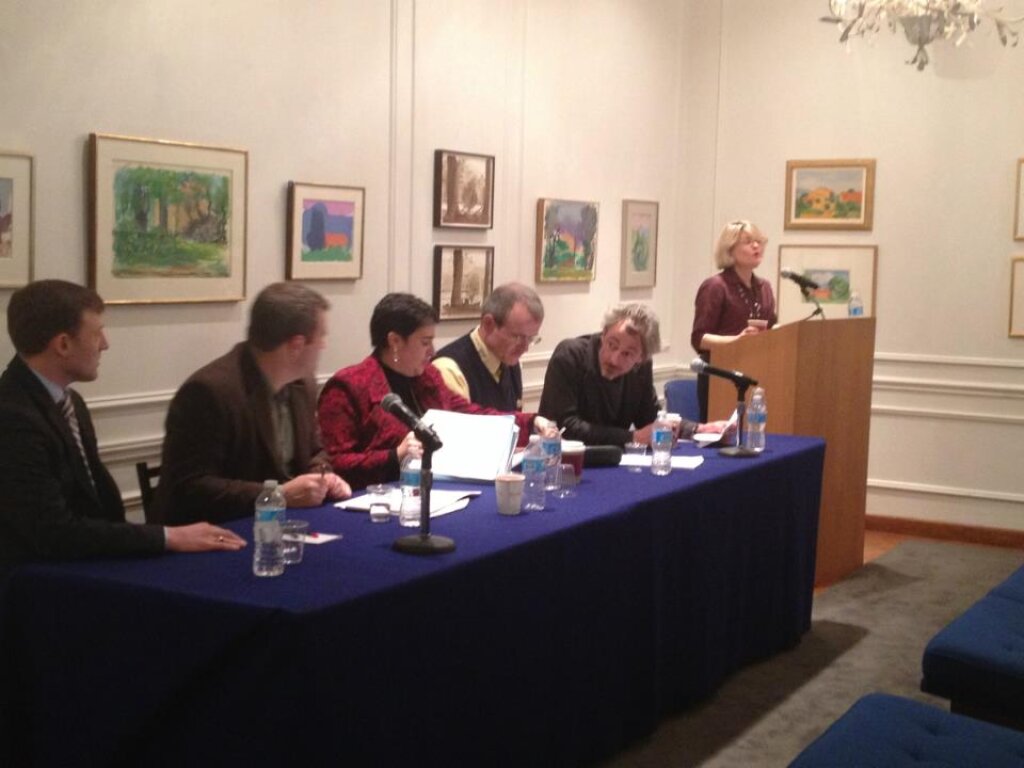Watch the video of the event here
On September 30, 2015, the NYU Jordan Center for the Advanced Study of Russia, in partnership with the NYU Global and Joint Program Studies, welcomed four experts for a panel discussion on “Journalism or Propaganda? Understanding the Russian media surge abroad” at the Arthur L. Carter Journalism Institute.
The panelists included Anna Arutunyan, a journalist formerly at The Moscow News and author of the Putin Mystique; Kevin Rothrock, RuNet Echo Project Editor at Global Voices Online and Producer at Meduza English; Konstantin von Eggert, Russian analyst and consultant and former Editor-in-Chief of BBC Russian Service Moscow bureau; and Ekaterina Zabrovskaya, the Editor-in-Chief at Russia Direct. The panel was moderated by Ilaria Parogni, Research Associate at the Jordan Center and Global and Joint Program Studies MA Candidate in Journalism and Russian and Slavic Studies. In her introduction, Parogni said that the aim of the discussion was not only to contextualize and analyze critically the rise of various international media projects sponsored by the Russian government, but also to problematize the tendency to write these outlets off as tools of mere propaganda tools, especially during times of tension.
In her opening statement, Arutunyan focused on the deliberate ideological shift in the Russian media which unfolded at the end of 2013. Working at The Moscow News, Arutunyan was a first-hand witness to President Vladimir Putin’s straightforward embrace of nationalism. At the time, the newspaper was published by the now defunct state-owned news agency RIA Novosti, which, albeit state-owned, was able to enjoy relative freedom of action and to provide independent coverage, until it was liquidated that year. In the process, the team at RIA Novosti was incorporated into the new media holding Rossiya Segodnya headed by Dmitry Kiselyov, who has close ties to the Kremlin. Arutunyan remembered thinking that “from now on, we are to report in the interest of the Motherland.”
For an authoritarian leader, Arutunyan noted that Putin has “an eclectic and loose policy towards the media.” In her experience, this allowed The Moscow News to meet the standards of professional contemporary journalism. She also remarked that the Kremlin’s media policy “looked towards someone more like Murdoch than to Lenin” and that it was by no means turning to Soviet propaganda. She highlighted that the problem with journalism in Russia is not unique to this country, but a global issue. Around the world, news is suffering from a loss of objectivity in terms of information, with editors aiming primarily for clicks and web traffic, she explained.
Rothrock agreed with many of Arutunyan’s points, noting that Westerners tend to write off the Russian media too quickly, either as a menace to the quality of public information or as propagandistic success that wields influence abroad.
“The Russian media’s influence on the West is almost non-existent,” he said. “With an open-market, readers can decide for themselves what is and is not credible.” In 2006, Rothrock observed, the television network Russia Today decided to shift its ideological stance to become a counterweight to mainstream Western media, because the network was struggling to attract international audiences with news exclusively about Russia. While this is sometimes criticized as subtle propaganda, he sees the shift as nothing more than a business strategy to increase relevance.
When outlets like Russia Today and Sputnik criticize the West, they usually point to police brutality, crimes of the military-industrial complex, and racial inequality – all topics that are also found in Western leftist media critiques, Rothrock said. He noted how both the Russian and the U.S. media illuminate news that mar their respective images. However, as long as these stories are not built on faulty information or outright lies, Rothrock believes that both countries deserve negative coverage, no matter where it comes from.
Following Rothrock, Von Eggert opened with an anecdote from his time at the Moscow bureau of the BBC. He recalled how Russian university students would often ask him what instructions he received from the British government to cover the news. “No one ever believed my reply that I never had a call from Downing Street 10 to tell me exactly how I should cover… the hot potato news,” he said. He then brought up a distinctive feature of the Russian media – cynicism.
“For 15 years and counting, the Kremlin’s been using, abusing, reusing, and recycling one thing: the inferiority complex of a lost empire,” von Eggert said. The Russian media is not as concerned with objectivity as it is with prioritizing a message of world conspiracy to its domestic consumers. Von Eggert agreed with Rothrock that the international impact of this message is minimal, but added that cynicism is “like the Rolex watch. Lots of people will buy it,” at least within Russia.
Von Eggert also noted that because Russian media companies get money from the state budget, they only have one viewer: Putin. The message Russian journalists convey “has to be in tune with the kind of things that people in the Kremlin think,” he said. Still, the analyst explained that the West fails to understand the worldview of the Kremlin. “[The Kremlin thinks] that the world is run by naked interest or naked force. There is no place for idealism,” he continued.
Zabrovskaya said that her work seeks to create intelligent, respectful dialogue and to provide a more nuanced and fact-based analysis in order to explain current events in Russia, hoping to bridge the gap between Russia and the West. Her team founded the website Russia Direct in 2013 after realizing that there was “good reporting on Russia, but not enough analysis of what was happening in Russia.”
Russia Direct is funded by Russia Beyond the Headlines, an intermediary of the Russian publishing house Rossiyskaya Gazeta. “The fact that we have Russian state funding is both our weakness and our strength,” Zabrovskaya said. While this risks to undermine Russia Direct’s credibility and forces her team to work harder to win the respect and trust of readers, the website’s editorial work is free of interference by its publisher. “We are journalists,” she said. “We treat our audience with respect and always provide at least two sides of the story.” The Editor-in-Chief said that Russia Direct has been accused of being Putin’s mouthpiece, the Fifth Column, and CIA agents, which she thinks proves they are “doing the right thing.”
In the discussion that followed, three significant themes emerged that distinguish Russian media from journalism in the West: the Kremlin’s eclecticism, cynicism in Russian media and the absence of a Russian legacy of independent journalism. In the West, Rothrock and von Eggert agreed, news outlets are independent of state intervention, because the government does not finance the media. Von Eggert also brought to attention that Putin’s eclecticism corrupts the practice of journalism in the country, and that it can be explained as a symptom of Russia’s survivalist regime. Rothrock argued that the Western media is corrupted by its idealism, which is also dangerous. Only a balance of these two extremes will produce fair reporting.
In the Q&A session that followed, Eliot Borenstein, N|YU Professor of Russian and Slavic Studies, asked the panel how to account for the suspension of judgment by media consumers in Russia today. Borenstein sees this as a shift from Soviet Russia, where there was a cynical awareness of the lack of objectivity in the media. Members of the panel responded that this paradox can be explained by the media’s ability to tap into widespread nostalgia for the Soviet Union and the desire for stabilization, two popular narratives that exist in Russia today. Global and Joint Studies MA Candidate Kat Thorton asked Arutunyan about self-censorship in journalism today and if this is an issue that differs depending on where a journalist is working. Other questions brought up the struggle for Russian media outlets to obtain licenses abroad and how the lack of a tradition of professional journalism in Russia consequently deprives people of a scale of reputation by which to judge journalists and their work.



